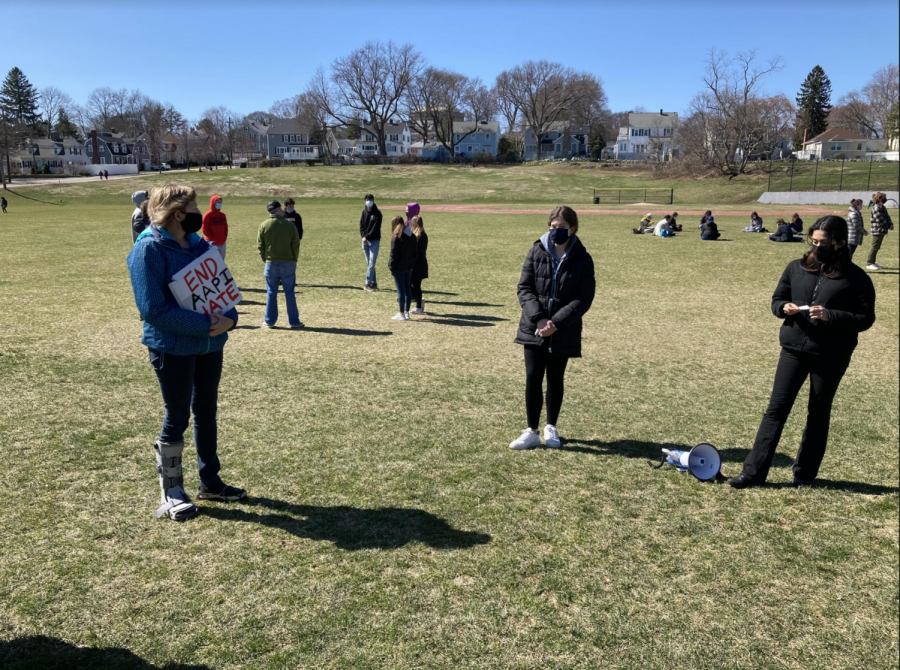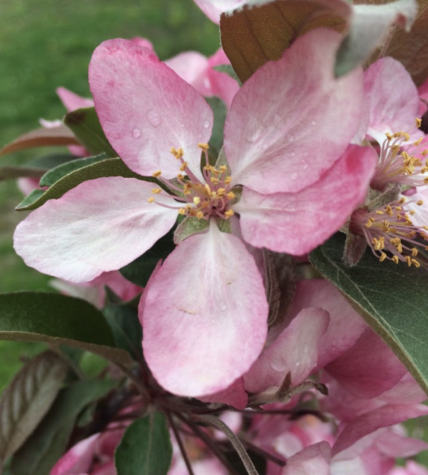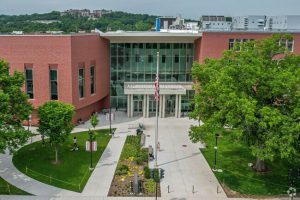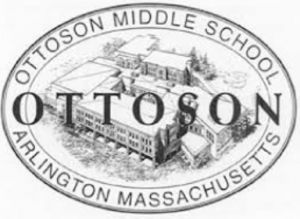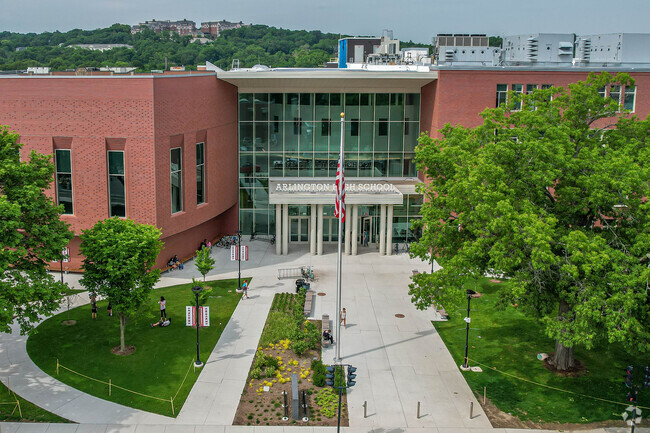AHS Asian American Coalition Holds Rally and Discussion About Racial Issues in America
Demonstrators gathered at Robbins Farm Park in early April to discuss and protest against anti-Asian hate// Photo credit Indigo B.
May 19, 2021
Racism against Asian Americans has existed for much of this country’s history. However, anti-Asian hate has come into greater focus over the past year, fueled largely by the blame leveled against Asian Americans for the COVID-19 pandemic. This simmering problem came to a boil in March when six women of East Asian descent were killed in shootings in Atlanta, Georgia. Although the Atlanta shooter did not credit race as a motivator in his crime, many people took his actions as an act of hate against those of Asian descent. Following the tragedy, anti-Asian racism was thrust into the spotlight as the relatively little-considered issue became a national discussion point. On Saturday, April 3rd, Arlington High School’s Asian American Coalition (AAC) held a rally and discussion at Robbins Farm Park aimed at raising awareness about anti-Asian racism and providing a space to have conversations about racial issues. “The Arlington High School Asian American Coalition seeks to combat the racism against the AAPI [Asian American Pacific Islander] community and create a safe space for people in this community to come together and talk about the issues they face,” tenth-grader and AAC member Linda told the Insider.
The rally opened with members of the AAC talking about their personal experiences with racism. Topics included under-the-radar racist jokes, unconscious bias, and stereotypes. “Stereotypes can take a large, diverse group of people, like Asian Americans, […] and really strip them from their identity and put them in a box,” one club member remarked. Another issue brought up was the confusion that Asian Americans often feel regarding privilege and the way that some say they are taught to keep their heads down and ignore racism against themselves. “Personally, I think the hardest part of being […] Asian American here in the US is all the confusion that you face. Like, are you too privileged? Are you marginalized? To what extent do you have a say in issues regarding race?” Linda said in her interview.
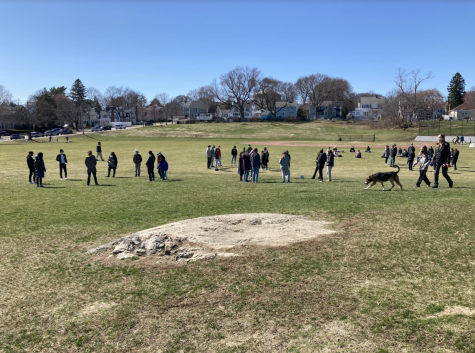
After the introductions, demonstration participants split up into distanced groups to talk about the recent violence against Asian Americans, and how members of the Arlington community can combat racism. After an icebreaker, the first prompt was for the group to discuss what they thought about the past year’s targeted violence, and the conversation tended to center around the Atlanta shootings which many perceived as an act of anti-Asian hate. Some people said they were surprised, some said they weren’t. One person expressed their dismay that “it takes something like a shooting in order to get people to start talking about racism against a certain group.” Media coverage of the shootings was brought up frequently in the conversation. “It’s appalling to me that those words could come out of somebody’s mouth,” they asserted, referring to the fact that Cherokee County Sheriff’s Office Capt. Jay Baker said that the Atlanta shooter had a “bad day.” Another person mentioned that the media tends to pick and choose when they cover issues.
Group members also discussed where they had witnessed or experienced racism, as a first-generation Iranian shared how when she was in middle school, a classmate made fun of her ethnicity by pretending that she had a bomb in her backpack. Many people discussed witnessing or experiencing subtle racism, like jokes that people outside of certain races or ethnic groups assumed were okay. However, one participant who helped found the group Arlington Fights Racism pointed out that even in a very liberal area such as Arlington, racism isn’t always so subtle. “There’s a lot of really in-your-face racism in Arlington. [Arlington Fights Racism] hear[s] from a lot of people of color who get stopped or followed because they’re Black and driving in town; they get followed home until their driveways,” she said. “[Racism] is really here.” Another participant talked about how she used to be friends with someone whose father would say racist things. She says she felt powerless to call out his words because of the power imbalance between adults and kids. “I wish I had done more,” she said. Group members also discussed their own biases, which included falling for the Asian model minority myth and making snap- judgments about people’s pronouns, names, and backgrounds
The conversation then turned to a prompt that asked group members to consider how to actively engage in antiracism. The Arlington Fights Racism founder acknowledged how difficult this can be. “You actually have to be engaged in this work every day, all the time […] It is hard work and you are not always welcome, and you’re not always responded to in a positive way. People in Arlington do not want to hear that there is racism here because we think we’re very progressive.” She went on to say that she was often called “divisive” or “angry” when she told people that racism is a local issue. However, she felt that it was her responsibility to use her privilege to speak out for people of color in a way that they themselves might be unable to due to safety concerns. Another group member explained that, to her, antiracism meant making sure that she was listening and to not “assume I have answers.” One participant related the importance of listening with advocacy, using the phrase “speak up, but don’t speak over.” There was also an extensive discussion about school curriculums and how many people feel the need to make them more inclusive and celebratory of a variety of cultures. “Every single history teacher I’ve had has been white,” said one high schooler, and two others agreed. Both group members said that they didn’t feel like teachers spent enough time covering difficult, racially charged topics and that they often brushed them aside, with one student saying that they found that teachers often considered discussions of the Black Lives Matter movement to be “too political.”
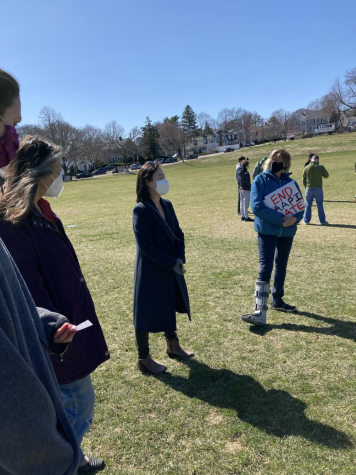
Despite all the changes that the group agreed needed to be made, one participant discussed how she did like some of the changes that she was beginning to see in school curricula. “It makes me happy to see [the changes] because I definitely did not learn about [race] in elementary school. I learned, like, ‘Martin Luther King, and then racism was over.’ It makes me happy to see that they’re starting changes in the curriculum,” she said.
The last prompt asked participants to consider whether we should focus more on the similarities or celebrate the differences between people. The group mostly agreed that society should be engaging in a combination of those things. “If we focus too much on the similarities, then people will feel like they can’t celebrate their differences, and therefore you’re just kind of stripping them away from who they are […] but then if you focus too much on the differences, [people will have] a strong bias in their head that ‘this person is different; therefore, they’re scary. So, you have to have a balance,” said one group member. Another person pointed out that focusing exclusively on the similarities between people can erase the fact that certain groups of people have faced hardships at the hands of other groups. To close out, the group discussed how even though our differences separate us, they can also be a uniting force.
The rally and discussion concluded with a group photo and a promise of more similar events in the future. In terms of what she wants Arlingtonians to be aware of concerning Asian hate and racism in the meantime, Linda said that she wanted for people to “really try to educate yourself on these issues as much as possible, and try to be super, super aware of what’s going on, and try to empathize with us and this community.”

